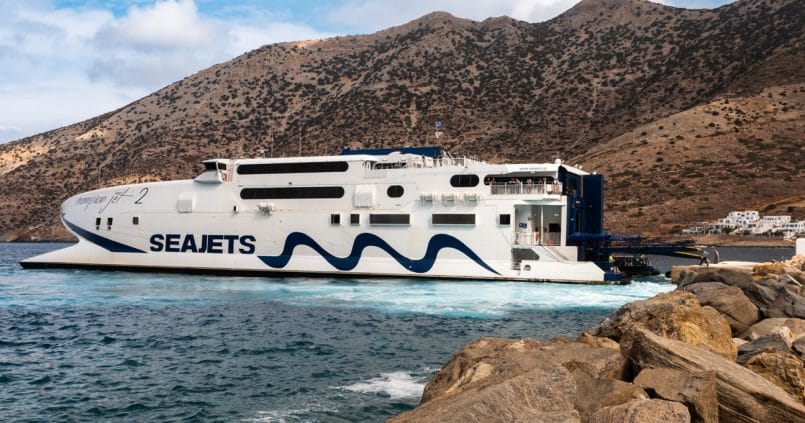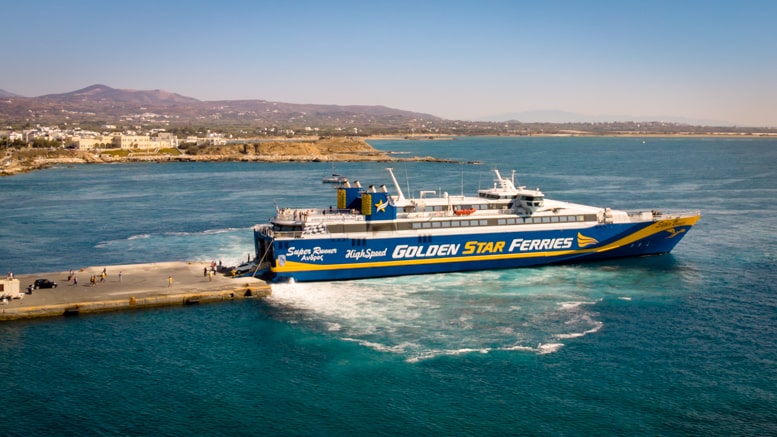Our previous article on Greek ferry travel was written in 2019 and needed an update, so here it is!
When it comes to ferry travel in Greece, these are the key questions most people want answered:
1. How can I travel between the islands I want to visit?
Ferry Routes
Understanding ferry routes can be a challenge even for experienced Greek travellers. Although routes generally persist from one year to the next, ferry companies have to bid to run these routes annually, with operators and routes often not being confirmed until well into the first quarter of the year (i.e., March). This makes planning a trip to Greece that involves one or more ferry crossings quite tricky, as you’ll often have to base your itinerary on last year’s timetables and hope they don’t vary too much.
Depending on the island group you’re visiting, ferries either leave and return to the mainland after each service—usually to the main port of Piraeus—or run in a loop or out and back between neighbouring islands, returning to their home port overnight. As a result, the busiest part of a ferry route is the first and last leg, when the ship is filled with passengers for every stop of its journey.
You can think of ferry routes in much the same way as a local bus service, with various stops on its journey from the starting port to where it finishes its route. You need to figure out whether a ferry route exists between the two (or more) islands you want to visit, and, if so, which company operates it and what days and times it runs. This could be done by visiting the various operator websites individually, such as Seajets or Blue Star Ferries, but this approach can be time-consuming, and unless you know every ferry operator, you can’t be sure you’ve checked them all. It’s much easier to use a third-party website that checks each operator and collates the results for you, as we’ll explain in the next section.
Itinerary Planning
One of the best websites for finding ferries covering a specific route is FerryHopper. Not only does it feature the vast majority of Greek ferry operators, but it’s also one of the few sites showing indirect connections, that is, routes requiring multiple ferries. For example:

The above screenshot shows that, in addition to Blue Star Naxos’ direct route from Piraeus to Amorgos, there is also an indirect route via Santorini.
This is especially useful when planning itineraries as it gives you a sense of which routes are available directly and which require multiple ferries. Better still, if you click on the green ‘i’ icon, it will show you the route the chosen ferry takes, allowing you to see which other islands it stops at on the way:

We’ve often used this to plan island-hopping trips, knowing that the islands are part of an established ferry route.
2. Should I book my tickets in advance?
Our previous article, written before the COVID-19 pandemic, advised avoiding booking tickets in advance in all but a few exceptional circumstances. While there are many reasons why you should still buy your tickets as close to departure as possible, the increased acceptance of e-tickets means this is no longer as clear-cut as it used to be.
In the past, booking ferry tickets in advance required you to obtain a physical paper ticket before boarding the ship. To do this, you had to visit a ticket office, present your booking details, and, often, pay a small fee (€1 or €1.50) to get the tickets printed. This negated any convenience of booking online and made it marginally more expensive. If you must visit a ticket office anyway, you might as well wait and buy the tickets in person, right?
Let’s consider the trade-offs between booking in advance and buying a ticket in person just before you travel:
- Buying in advance guarantees you a spot on the boat but limits your flexibility to change plans before you travel.
- If ferries are cancelled in bad weather, the operator you’ve booked with will put you on their next scheduled service; however, if other operators have ferries departing sooner to the same destination, you won’t be able to get a refund and would need to buy a separate ticket to travel with another company.
- Ticket prices are fixed, so there is no financial benefit to buying them in advance, unlike flights or hotels with demand-driven and seasonal pricing models.
Many operators now accept e-tickets when boarding by scanning a QR code on your phone or from a printed booking confirmation, as you do with most airlines.
We recommend booking in advance around Greek national holiday dates when many locals travel to and from the islands to celebrate with family and friends. Wikipedia has a list of Public holidays in Greece. If you plan to travel around any of these dates (specifically the weekends before, during and after), it’s probably worth buying your ticket well in advance to avoid missing out.
Lastly, many Greek islands are becoming increasingly popular during the peak season — early July to mid-September — particularly in the Cyclades. If you’re travelling between any of these islands: Mykonos, Naxos, Paros, Ios and Santorini during the height of summer, you might want to reserve a space on the ferry you’re planning to use. There are usually multiple daily services, so it’s unlikely you wouldn’t find any availability. However, some services are more popular than others, especially ones that travel between late morning and mid-afternoon, as these are the times most tourists want to switch islands.
3. How early do I need to get to the port?
If you’re used to travelling by plane, the idea of arriving at the airport in plenty of time is probably ingrained into your routine. However, when it comes to Greek ferries, there’s no need to arrive early as long as you can set foot on the boat before it departs.
Greek ports aren’t the most pleasant places to wait around, particularly during the hot summer. Shade is always at a premium—a small covered area is the best you can hope for, but it’s rarely large enough to accommodate even 25% of the passengers in peak season—and the area is generally crowded with cars, mopeds, and passengers coming off recently arrived boats.
To minimize the time spent waiting for the ferry, I use MarineTraffic to track the progress of the boat I will be taking. This website shows, in near real-time, the position of all ships. At the top, you can search for a vessel by its name – which you can find on your ferry ticket or booking confirmation, and it will then show you the boat’s current location if you click the white circle/target icon on the right:


To be on the safe side, I still plan to arrive at the port 10-15 minutes before the departure time—just in case MarineTraffic has stopped working. However, using this website, you can sit comfortably in a nearby cafe/taverna, enjoying a cold beer or coffee as you monitor the ferry’s progress. When it gets close to the port, grab your bags (remembering to pay your bill, of course!) and stroll over just in time to step on board.
One final word of caution: ferries arrive and depart quickly! I’ve seen several people caught out when a boat sets off just a few minutes after arriving, leaving some unwary passengers stranded on the dock. Greeks are often stereotyped as slow and inefficient, but you wouldn’t think that if you’ve ever seen a ferry arriving on a Greek island! High-speed or passenger-only ferries only dock long enough for people to get on and off the boat and will leave as soon as the last queued passengers have boarded.
Also, be sure to check the name of your boat–larger ports can accommodate multiple ships and often have similar-looking vessels from the same operator. It’s your responsibility to get on the right one. Port Authority police and ferry staff will usually help if you ask, but knowing the ship’s name will make getting into the proper queue and on the correct boat much more straightforward.
4. What happens if my ferry is delayed or cancelled?
In my experience, Greek ferries are surprisingly reliable. I’ve only suffered one ferry cancellation in seven years of island hopping (in 2022 from Astypalea to Kos). Delays are more common, though they tend to be 15-30 minutes rather than several hours.
In the event of a delay, there’s not much you can do besides wait around near the port until the ferry arrives — using MarineTraffic as described above can give you some idea of when it will turn up, allowing you to head off to eat or do some shopping or sightseeing. Many cafes and tavernas near ports will let you leave your luggage inside so you don’t have to carry it around, though this is done at your own risk. The Greek islands are generally safe and have low crime, so I’ve never had any issues, but I keep my valuables in a separate rucksack that I always carry with me.
If the ferry is cancelled, you should be notified by text or email, depending on how you booked the tickets and what contact information you provided. Typically, you supply a mobile number when buying tickets in person, whereas an email address (and mobile) is more common for online reservations.
If you aren’t sure whether the ferry has been delayed or cancelled after arriving at the port, the best action is to ask the port authority staff or find the nearest ticket office and check with them if the boat is running.
When a service is cancelled, you should be entitled to a refund or be put on the next available ferry from the same company. This might be the following day (or several days), so you must arrange accommodation and re-arrange any onward journey plans accordingly. It’s worth checking if an alternative service or route is available to see if you can get to your next destination another way, including flights if the island you’re currently on has an airport and you need to get moving as soon as possible.
In my single experience of cancellation, I was lucky to get booked back into the accommodation I’d just vacated for an extra two days, and the refund of my cancelled ferry ticket more than covered the cost of the replacement service. However, I lost money on the accommodation I’d booked on my next island and had to pay for, but it was a small enough amount that I couldn’t claim back on my travel insurance.
If you’re worried about cancellations, having a backup plan in mind can take some of the stress away–know what alternative services are running, even if it’s an indirect route, and try to book refundable accommodation where possible. If you need to extend your stay on your current island, contacting the accommodation you were staying at is probably the best option, as they may be able to get you back into the same room you just left if it’s not booked up for new arrivals. In peak season, making accommodation arrangements should be your priority, as there could be many other travellers in the same situation when a ferry is cancelled, all trying to rebook rooms.








Comments (1)
Pingback: Don't buy ferry tickets in advance. - Greece Travel Guide